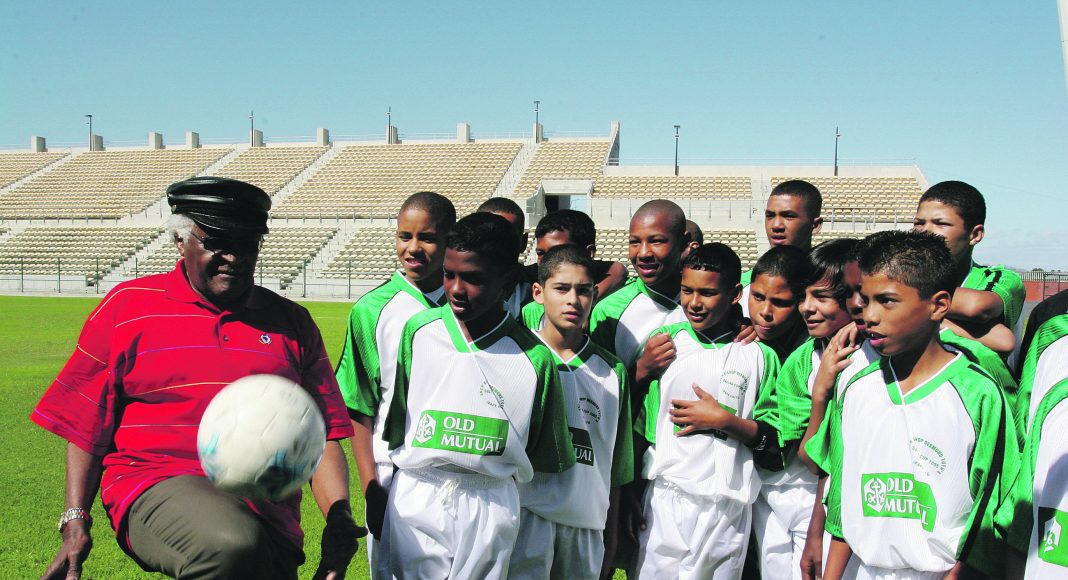Johannesburg- Pays tribute to the late Archbishop Desmond Tutu . Not many people know that Archbishop Emeritus Desmond Mpilo Tutu was a rugby player in his teens.
Tutu enrolled at the Johannesburg Bantu High School in 1945, where he excelled in his studies.
As the name Bantu suggests, the school was under-resourced because it served black people. The name was coined by the colonisers of the time to refer to the indigenous people of the southern African region.
At the age of 14, Tutu joined the school’s rugby team, developing an everlasting and lifelong love for the sport of the oval ball but not exclusively, as he enjoyed watching and taking part in all sporting events and presiding at ceremonies of other sporting codes.
Not many know that the young Tutu earned a bit of extra cash and pocket money as a golf caddie, carrying bags for white golfers.
At the time, black people only entered the lily-white golf courses or any other white sports arena as workers, in the case of golf as caddies.
Although it is not clearly documented how far the Arch went to become an outstanding rugby player, I would presume he was dedicated to the sport because by his nature, everything he set his eyes on, he would accomplish.
South African sport was already segregated before the promulgation of apartheid that was to be enforced through legislation by the architect of racial segregation and separate development, prime minister Hendrik Verwoerd.
Long before the National Party came to power in 1948, what has now been termed “petty” apartheid in schools and schools sports was being practised after the formation of the Union of South Africa in 1910.
Tutu’s fight against segregation and the formalisation of apartheid in sport is well-documented as he loathed all forms of racial discrimination and the dehumanising of one race by another.
During the turbulent years of the 1970s and 80s, the Arch supported all formations of sporting organisations opposed to the white regime’s sports sanctions-busting moves.
He was vehemently critical of all countries, more so the English, who were hell-bent on touring South Africa.
The English had planned to break the sports boycott by playing rugby and cricket against the all-white South African teams.
In 1989, Tutu the cleric censured and condemned the English cricket team and its captain Mike Gatting for preparing to tour South Africa in what was subsequently known as the “rebel tour”.
The English rebels arrived in the country in 1990 amid a flurry of protests led by Tutu and black political formations, including the United Democratic Front, of which he became a patron in 1983.
Credit should go to the National Sports Congress (NSC) leaders who were at the forefront to ensure that the tour was cancelled.
The tour turned into a humiliating exercise for both the isolated government of the day and the SA Cricket Union (Sacu).
The apartheid government was left with an egg on its face and the white cricket body was in shambles as the English visitors packed their bags and returned home.
Sacu managing director Ali Bacher went on to lead the first cricket team’s tour of India in 1992 following the late statesman and former president Nelson Mandela’s release in 1990.
Bacher announced that “in view of the recent dramatic political developments” Sacu decided to make a “gesture of conciliation and compromise” and cut the tour by half, and the NSC, which had spearheaded the anti-tour effort, in return agreed to call off demonstrations at the remaining four Test matches and all planned One-Day Internationals.
Follow @SundayWorldZA on Twitter and @sundayworldza on Instagram, or like our Facebook Page, Sunday World, by clicking here for the latest breaking news in South Africa. To Subscribe to Sunday World, click here




